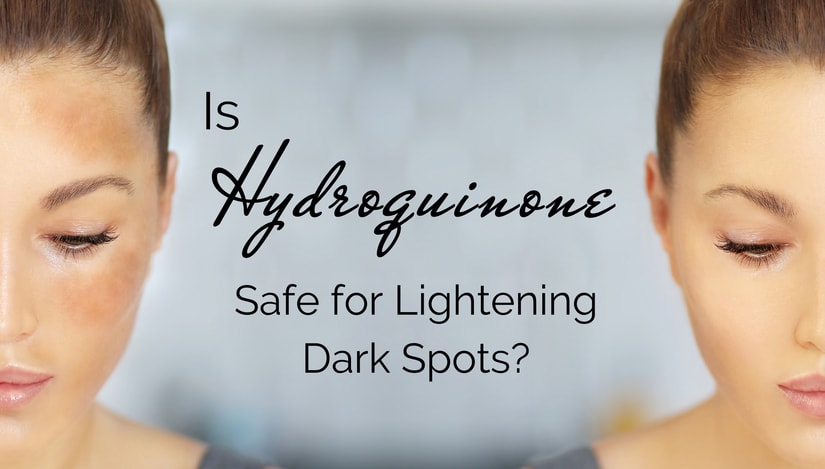Hydroquinone is one of the most widely used active ingredients in skin care – at least in the US – and yet a debate rages about the side effects and its safety.
You may have heard of hydroquinone in association with topical skin lightening creams particularly those aimed at treating age spots.
Most women with dark spots want to get rid of them and one of the simplest and most cost effective ways is to use a topical product containing a lightening agent. One of the most effective is hydroquinone.
Done deal you might say – but not if you live outside the US.
In Europe it is banned as a skin whitening agent in cosmetic use under a Directive issued in July 1976.
You can’t get it in Japan, Australia or South Africa either where similar bans are in place.
Hydroquinone and the FDA
Even in the US hydroquinone hasn’t been without controversy.
The FDA considered research studies on the possible side effects of hydroquinone in 1982 before granting approval for its use in over the counter and prescription products.
In 2006 the FDA took another look at hydroquinone on the basis of the further research that was available and went so far as to issue a “proposed banning order” for use in over the counter products.
After objections from – among many others – the American Academy of Dermatology – the ban never went ahead. Now some 16 years later – it seemed like the proposal to ban hydroquinone in the US had died a slow death.
Until April 19, 2022 when the FDA issued warning letters to 12 companies for selling over-the-counter (OTC) skin lightening products containing hydroquinone that do not meet the requirements to be legally sold as OTC drugs.
Most US skin care manufacturers though continue to use hydroquinone as an active ingredient in over the counter age spot and skin lightening creams for topical application.
If you are looking for a skin cream for age spots and you live in the US then you are faced with a dilemma – should you use it or go for a different lightening agent without the possible side effects?
What is hydroquinone?
According to WikiPedia – hydroquinone is a type of phenol (carbolic acid) and is a white solid in form. It has antibacterial properties when applied topically as well as a capacity to lighten skin.
Hydroquinone is mixed in creams of varying strengths and sold by prescription (up to 4%) and over the counter (up to 2%).
Hydroquinone creams applied to the skin inhibit the action of an enzyme called tyrosinase resulting in the suppression of melanin – the pigment that gives skin its brown color.
At the time of the proposed ban in 2006 over 65 companies in the US produced over 200 topical creams and lotions containing hydroquinone.
Hydroquinone safety
Based on the reactions of the authorities in Europe and other countries you might be led to believe that hydroquinone has some pretty severe side effects. So – just what are the risks of using hydroquinone?
1. Hydroquinone and cancer
One of the most disturbing hydroquinone risks was its possible link with cancer. It was this link that above everything led many people to think again about buying a cream based on hydroquinone. But if you dig deeper into the evidence that it causes cancer looks a little thin.
Dr Paul M Friedman, Professor of Dermatology at the University of Texas is quoted in WebMD as stating “hydroquinone has been used over the last 40 years and there has not been a single documented case of either skin cancer or internal cancer associated with it.”
The FDA proposed ban in 2006 was based on research showing “some evidence” that hydroquinone may cause cancer in rats. No evidence existed that it had caused cancer in humans.
The studies causing concern to the FDA at the time included a Japanese study in 2005 where rats were given high doses of hydroquinone in their feed for two years with the (somewhat unsurprising) result that they developed cancer of the liver and kidney.
Topical hydroquinone is absorbed very slowly through human skin and creams contain very low concentrations compared to the amount fed to the rats in the study. There are many drugs which have been found to cause cancer in rats but have no effect at all in humans.
So – unless you start sprinkling it on your cornflakes it is difficult to see where the link between hydroquinone and any form of human cancer is coming from.
Most qualified commentators have concluded that the link between cancer in humans and hydroquinone applied topically in a cream is dubious.
Or as Dr. Susan Taylor, Assistant Professor of Dermatology at Columbia University, stated in the Dermatology Times, “if you give a rat enough of anything orally it may well develop cancer”
2. Other side effects
Hydroquinone has also been linked with a condition called ochronosis which is a build up of dark pigment in connective tissue.
Skin affected by ochronosis develops disfiguring raised dark gray and yellowish spots and the condition is only seen in skin of color (African-American, Hispanic and Asian).
The link between the use of hydroquinone and ochronosis was first observed in South Africa where doubtful marketing campaigns resulted in long term over use of hydroquinone products to lighten skin – sometimes for as long as 10-40 years at high concentrations.
Cases of ochronosis following hydroquinone use in the US and the UK have also been reported but in much smaller numbers.
Dr Taylor at Columbia concluded that ochronosis as a result of hydroquinone use is a “very infrequent problem” in the US.
The US has seen around 200 reported cases over millions of users of hydroquinone products since approval was first granted for over the counter use in 1982.
Is hydroquinone safe?
Whilst the debate still rages – it does appear that for certain skin types hydroquinone can be associated with skin damage (ochronosis).
Side effects of this type seem to occur mostly when skin lightening creams with hydroquinone at high concentrations are used over a prolonged period of time.
This is not exclusively so as there are some studies showing that there is a risk of skin damage after short term use although this is always associated with unprotected sun exposure as well.
If you have the dark skin type that is likely to be affected by ochronosis then the safest route would be to talk to a dermatologist rather than purchasing over the counter products and use hydroquinone cream only as directed. Check what Sydney Sweeney does for her Skin Care.
Hydroquinone and hyperpigmentation is more straightforward. For Caucasian skin types hydroquinone creams are likely to be a safe and effective treatment to reduce or eliminate age spots. Creams and lotions for age spots are meant to be applied for short periods of time until the hyperpigmentation has faded. Provided you stick to that you should not have problems.
Whilst dangers have been exaggerated – it will pay to be sensible in the long run. So make sure you set time limits for using these products (maximum 3-4 months at a time), limit sun exposure and apply high factor sun screen to areas treated.


